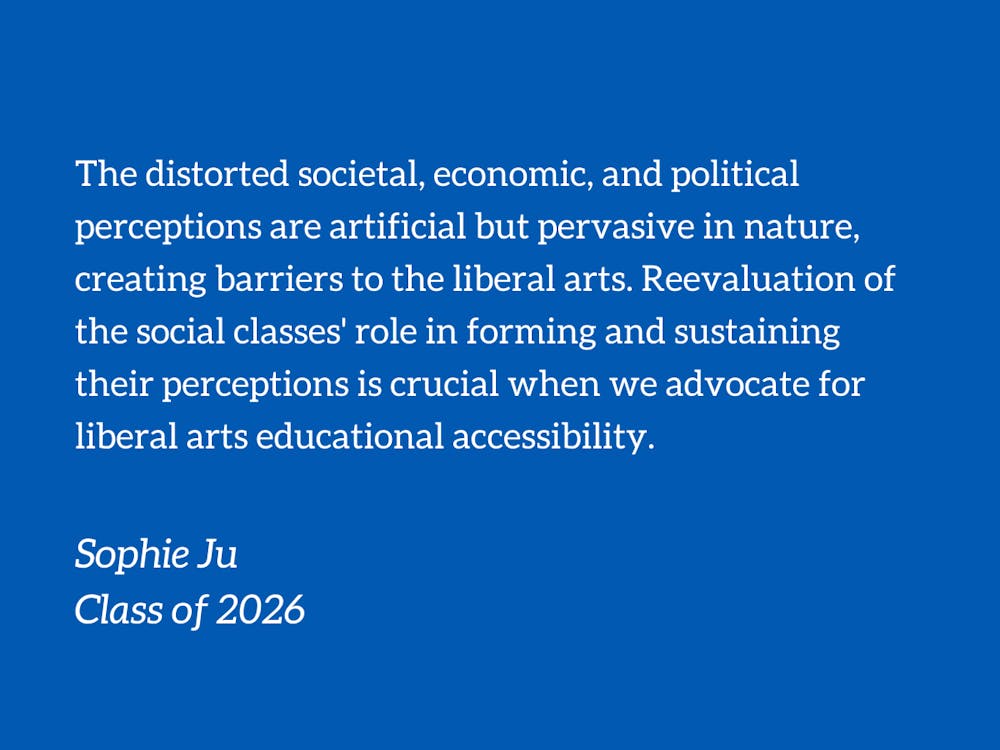Liberal arts have long since been the subjects of study. Despite being naturally diverse and broadly defined, higher-education liberal arts programs have clear and transparent end goals for students: to think creatively, critically and independently. They also provide practical professional knowledge and transfer empathic, intellectual and communicational skills. Understandably, this utility should not be denied to any social class.
Unfortunately, many barriers — including an "elite-only" societal attitude and economic and political limitations — may discourage us, especially students from working-class or first-generation backgrounds, from enrolling in the liberal arts. In this context, we need to see through the artificiality of these barriers when advocating for liberal arts educational accessibility.
The common "elite-only" misconception about liberal arts is deeply intertwined with the history of education. Valerie Strauss, in her "The liberal arts are under attack" article, writes that many people are too familiar with the idea of a "gentleman's education" — an education reserved for people who are secure in their financial and social status. Liberal arts have been misinterpreted as a gentleman's education by the public, despite having shed their historical roots by offering educational opportunities to the public.
A more cynical answer is that, considering all the effort put in enrolling in and graduating from liberal arts-focused colleges and universities, the liberal arts curriculum's academic rigor — the actual subject matter — is only an illusion covering the actual Ivy diploma's worth, which lies in the associated prestige and numerous social contacts made during its attainment. People who have successfully reached a certain societal level might have the desire to restrict liberal arts education solely to their children, creating barriers to prevent the rest of society from defeating the "elite" competition.
Apart from the distorted social perception, the current economic and political tendencies fatally curtail access through skyrocketing tuition, student loan debt, legislative budget cuts and political anti-intellectualism. Meanwhile, Strauss notes that there is a large political support for increasing corporate control over higher education. It is done through the privatization of colleges and K-12s, seeking both to transform education into a profit-focused enterprise and to simultaneously replace liberal students and teachers with more corporate-compliant ones. In doing so, the dominant political party will receive a chance to weaken the opponent's education and public employment systems.
Another limitation is that liberal arts education is deemed of questionable financial value, especially when people debate on whether students from working-class or first-generation backgrounds should enroll in the liberal arts. Particularly, the main concerns relate to relatively low financial returns and future labor market uncertainty.
The liberal arts do, in many ways, contrast traditional technical or professional programs. Elena Tokareva, the co-author of the "Prospects of the Liberal Arts Educational Model in the National History Study" article, defines this educational model as a generalized curriculum aiming to provide the students with broad experience and understanding rather than specific professional knowledge. Hence, some politicians advocate for increased financial support of other educational models at the expense of liberal arts and humanities funding.
These tendencies leave an open question of the true value of liberal arts for the general population.
A worthy notion regarding the philosophy of liberal arts is that it is opposed to wealth — the typical "elite" attribute. In particular, it is paradoxical to associate liberal arts education with the rich — many classical writings of this curriculum condemn wealth. For instance, Socrates taught his students in Athens to embrace a life of poverty in search of wisdom and virtue. This subversive doctrine led the philosopher to his arrest and consequent execution. In this context, Socrates' thoughts are similar to the ones from the New Testament, where the dominant theme is also the condemnation of wealth.
The ideologies that are taught in the liberal arts don't create a barrier to working-class and first-generation students.
On the contrary, the distorted societal, economic, and political perceptions are artificial but pervasive in nature, creating barriers to the liberal arts. Reevaluation of the social classes' role in forming and sustaining their perceptions is crucial when we advocate for liberal arts educational accessibility.
Sophie Ju is a Trinity first-year. Her column typically runs on alternating Mondays.
Get The Chronicle straight to your inbox
Signup for our weekly newsletter. Cancel at any time.

